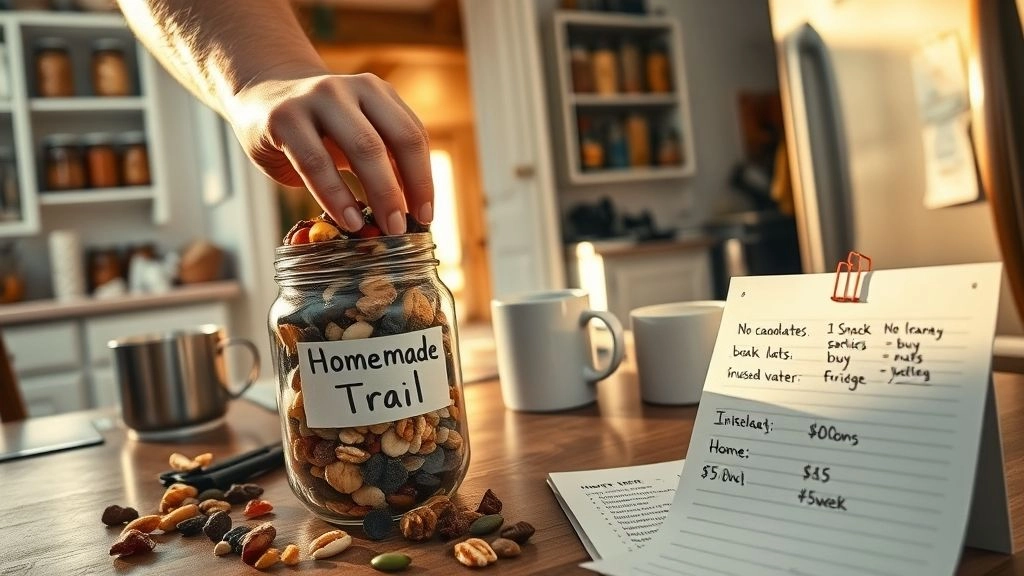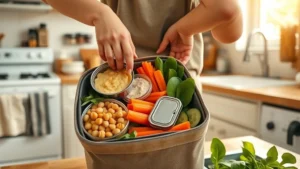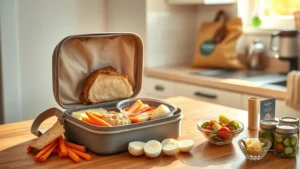You know that bottomless feeling when you open your pantry and still catch yourself grabbing a snack… again? Yeah, me too. And you glance at the receipt later and think, “Wait, where did all that money go?” If you’ve ever wondered how to stop spending money on snacks—not the “save money on food” kind of tips you hear all the time, but the real deal on ditching those impulse munchies—this one’s for you.
Snacks are sneaky little budget bandits. They’re quick, convenient, and often disguised as harmless treats—even comfort. But over time? They add up, and your grocery budget takes the hit. Let’s take a friendly stroll through how to outsmart those cravings without feeling deprived. Sound good?
Snack Spending Secrets
Why Do Snacks Steal Your Cash?
Have you ever thought about where your snack money really goes? It’s often the small bites here and there—the candy bar at the checkout, a soda with lunch, the “just one more” cookie. One Reddit user shared how takeout lunches and snack runs quickly turned into a monthly drain. The habit isn’t just about hunger; sometimes, it’s stress, old routines, or just convenience pulling the strings.
Here’s what’s wild: snacks can be a big chunk of the overall food budget—research on spending habits shows food takes around 12% of household budgets, and snacks are a surprising chunk of that number. Toss in the fact that snacks often come packaged and processed, which costs more, and you’re spending more than you think.
Snack Spending Breakdown
| Snack Type | Weekly Cost (Approx.) | Smart Swap Idea |
|---|---|---|
| Vending Machine Chips | $10 – $15 | Homemade trail mix (~$5 batch) |
| Office Coffee + Snack | $8 – $12 | Home brewed coffee + bulk nuts |
| Convenience Store Soda | $7 – $10 | Infused water with fresh fruit |
When you think about it like this, it’s kind of amazing how those little treats pile up. If you’ve ever felt like I hate spending money on food, those snack expenses might be a big culprit.
What Triggers Your Cravings?
Let’s get real—snacking isn’t just about filling your belly. What about the times when you’re bored, stressed, or just need a break? Ever notice you’re reaching for chips while scrolling on your phone or waiting for dinner to cook? That’s your brain looking for a quick hit—comfort, distraction, or just plain habit.
If you keep track of when and why you snack, it might surprise you. Maybe it’s mid-afternoon fatigue or the usual “I deserve this” after a rough day. One tip from nutrition experts and frugality fans alike is to plan for those moments. Stock up on easy, healthier options so you’re less tempted to grab pricey junk food.
And if you ever wonder what can you do to protect the quality of the foods you buy when you get home?, start with how you store your snacks. Airtight containers extend snack life, so you’re not throwing money away on stale chips or spoiled yogurt.
Snack Smarter Strategy
Make Your Snacks Work for You
Here’s a little secret: snacks don’t have to be expensive or unhealthy to be satisfying. One smart move is making your own simple snacks at home. Think mini-pancake bites, homemade granola bars, or energy balls—easy, freezer-worthy, and way cheaper than store-bought processed stuff (which, let’s be honest, is usually loaded with stuff we avoid).
When you prepare snacks yourself, you control what goes in (and get to sneak in some surprising health benefits). Plus, they usually stretch farther and can be portioned out better. Try prepping a week’s worth of snacks and freezing them—it makes grabbing a quick bite just as convenient as opening a bag, but with less waste and guilt. I swear, my six-year-old can’t get enough of chocolate chip mini pancakes, and secretly, I snag more than a few too.
Plan — But Keep It Real
Trying to cut out snacks cold turkey? That’s tough. Like someone shared about fast food, it’s smarter to be realistic and budget for your favorites instead of going full-on deprivation mode. Give yourself a little wiggle room—maybe a designated treat or two each week—and watch how that planned approach helps you say no to unplanned impulse buys.
Having this balanced mindset can help you outsmart the urge to binge or overspend. Plus, it keeps your snack stash from becoming a never-ending money pit. Moderation is key—and you can still enjoy those comforts while sticking to your budget. If you’re curious about how to stop spending money on unnecessary things, this approach nails it.
Budget-Friendly Snack Hacks
Shop Smart, Buy Bulk
Shopping in bulk sounds pricey upfront but think of it like this: buying a small bag of nuts or trail mix often costs way more per ounce than a big tub of the same. Buy in bulk, portion it out yourself, and you avoid giving your money away to single-serving prices. Bonus points if you freeze portions to keep them fresh.
And hey, don’t be shy about scavenging those “reduced for quick sale” sections. You can grab snacks that might have a slightly shorter shelf life for a steal. Those savings add up fast!
Cut Convenience Costs
Pre-cut fruit and snack packs are amazing when you’re on the go, but they come with a price premium. AARP points out that buying pre-prepared snacks leads to spending more over time. Instead, prep your fruit and veggies at home once a week and pack your own snack bags. It only takes a few extra minutes, and you get control over what—and how much—goes in.
This ties into how to stop spending money on unnecessary things—cutting out convenience expenses wherever possible frees your budget for the things you really want.
Use Apps and Coupons
If you love a good deal (and who doesn’t?), download grocery store apps that highlight sales or offer digital coupons. These can make a difference, especially when you pair them with your snack shopping. Some apps even have cashback incentives on your usual purchases.
Plus, planning your weekly snack stock around sales means you’re buying smarter, not harder. This way, you’re actively working Spending too much on food and turning it into spending less, without feeling like you’re missing out.
Mindset and Habit Hacks
Track Then Tweak
You don’t need complicated spreadsheets, honest. Just jot down what snack buys you made each week. When you see the numbers, it’s often a surprise. Like one friend who realized half her snack budget went to impulse candy bar buys at work.
Once you’re aware, you can experiment by swapping one or two snack choices for cheaper or homemade options. Even little changes make a dent.
Change the Routine
If you find yourself mindlessly grabbing snacks during certain times—mid-afternoon slump, say—try switching up the routine. Stand up, stretch, drink water, or have a cup of tea first. Sometimes the craving isn’t really hunger; it’s a pause your brain needs.
Creating a new habit to replace the snack grab is about patience, but over time, it sticks. Plus, you get the double-win of feeling more in control and saving money!
Give Yourself Grace
And here’s the thing—if you mess up, it’s okay. Snacking is part comfort, part habit, part joy. Acknowledge your wins instead of beating yourself up over slip-ups. Remember, the goal isn’t perfection but progress. If your goal includes understanding I hate spending money on food but still loving food, this balanced mindset gets you there.
Wrapping It Up
So, thinking about how to stop spending money on snacks means more than just slapping a budget on impulse munchies—it’s about understanding those urges, planning smart, and building habits that feel doable, not like a punishment. Whether it’s making your own freezer-ready snacks, buying in bulk, or just keeping track of your buys, small steps add up.
Remember the little wins are victories: packing a homemade snack instead of grabbing a $4 candy bar, saying no when the vending machine calls your name, or simply knowing that next week you’ll try a new energy ball recipe. You’re not just saving money—you’re building a relationship with your food and your budget that’s kinder and smarter.
Ready to take back control? Start today by jotting down your last week’s snack spends. See how many of those treats you really needed versus just wanted. Try a homemade swap or two. And don’t forget, if you need some extra ideas on how to stop spending money on unnecessary things, there’s a whole world of tips online waiting for you.
Hey—if you’ve ever felt like I hate spending money on food, know you’re not alone. Let’s snack smarter together.













